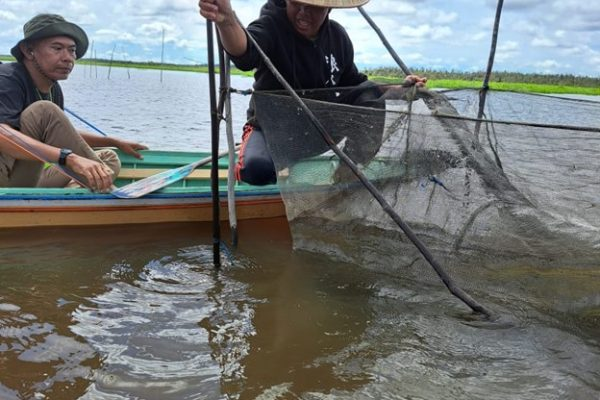Universitas Gadjah Mada (UGM) actively works to protect and restore ecosystems under threat through research and partnerships with industries and global institutions. From addressing mercury contamination in Obi Island to studying freshwater biodiversity in Lake Siran, UGM engages in innovative solutions to maintain and extend plant and animal biodiversity. Partnerships with organizations like MTCRC and Antioch College showcases UGM’s commitment to safeguarding fragile ecosystems and advancing sustainable development.


The gold mining process involving mercury has resulted in significant pollution in the Obi Island area, with mercury emissions contaminating both the waters and the soil. In response to this issue, lecturers from the Faculty of Biology, in collaboration with a research team from the Mokrobiology Research Centre, the Ecology and Ethnobiology Research Centre of the National Innovation Research Agency, SEAMO-BIOTROP, Hasanuddin University, Hein Namatemo University, and the MoEF Forest Plant Seed Centre, have undertaken research focused on mitigating environmental damage and reducing the impact of mercury contamination through rhizoremediation technology. This research aims to alleviate the adverse effects of gold mining on marine ecosystems.


Several lecturers, students, and alumni from the Faculty of Biology are collaborating with the Nusantara Nature Conservation Foundation (YKAN) to research freshwater biota in Lake Siran, located in Muara Siran Village, Muara Kaman District, Kutai Kartanegara, East Kalimantan. This research aims to gather data related to the biodiversity and conservation status of aquatic biota to understand the role of freshwater biota in meeting the community’s economic needs. The data obtained include 56 fish species, 3 shrimp species, 1 crab species, 2 water snake species, 1 python species, and 1 water monitor lizard species. This can be used to maintain and expand the existing biodiverse ecosystem.


Research collaboration in biodiversity conservation is vital for addressing complex and interconnected challenges that threaten ecosystems globally. Collaborative efforts bring together diverse expertise, resources, and perspectives from multiple disciplines and regions, enabling a more comprehensive understanding of the key issues and the most promising solutions.
The Faculty of Biology UGM is advancing efforts to maintain and extend ecosystems and their biodiversity through a research collaboration with Antioch College, Ohio. This initiative focuses on ecological education and conservation in Southeast Asia, targeting ecosystems under threat, including water ecosystems. UGM faculty, including ecology experts, emphasized opportunities for joint research and industry engagement to protect and restore biodiversity of both plants and animals. Aligning with sustainable development goals, this collaboration highlights UGM’s proactive role in safeguarding fragile ecosystems while fostering global partnerships.

UGM has partnered with the Korea-Indonesia Marine Technology Cooperation Research Centre (MTCRE) to advance research and innovation aimed at maintaining and extending marine ecosystems and their biodiversity. The collaboration focuses on critical areas such as blue carbon, coastal management, biodiversity mapping, and remote sensing technology. Key activities from this partnership include joint research, field surveys, staff and student exchanges, capacity-building programs, and workshops.
This partnership aims to address pressing marine and coastal issues, especially those affecting ecosystems under threat, by leveraging advanced technologies and scientific expertise. With UGM’s extensive experience in research and PPKTK’s technological capabilities, this initiative highlights the importance of industry-academic synergies in solving complex maritime challenges while enhancing biodiversity conservation efforts in Indonesia’s vast aquatic regions.
References:
